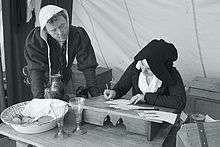Scrivener
| Look up scrivener in Wiktionary, the free dictionary. |
-public_typist.png)

A scrivener (or scribe) was a person who could read and write or wrote letters to court and legal documents. Scriveners were people who made their living by writing or copying written material. This usually indicated secretarial and administrative duties such as dictation and keeping business, judicial, and history records for kings, nobles, temples, and cities. Scriveners later developed into public servants, accountants, lawyers and petition writers.[1]
Current role

Scriveners remain common in countries where literacy rates remain low; they read letters for illiterate customers, as well as write letters or fill out forms for a fee. Many now use portable typewriters to prepare letters for their clients. However, in areas with very high literacy rates, they are almost non-existent.
Etymology
The word comes from Middle English scriveiner, an alteration of obsolete scrivein, from Anglo-French escrivein, ultimately from Vulgate Latin *scriban-, scriba, alteration of Latin scriba (as scribe).
In Japan, the word "scrivener" is used as the standard translation of shoshi (書士), in referring to legal professions such as judicial scriveners and administrative scriveners.
In the Irish language a "scríbhneoir" is a writer, or a person who writes. It has nearly the same pronunciation as the English word "scrivener".
In ancient times, a scrivener was also called a calligraphus (pl. calligraphi).
In literature
A famous work of fiction featuring scriveners is the short story "Bartleby, the Scrivener" by Herman Melville, first published in 1853.
Scrivener notaries
Scrivener notary tasks generally may include:
- Authentication and drafting of legal documents for use overseas
- Ballots (new issues); stock and bond redemption
- Bills of exchange
- Business start-up and corporate administration
- Construction project tendering
- Exchange control and foreign investment formalities
- Inheritance
- Legalization of documents
- Purchase and sale of overseas real property
- Shipping law
- Trademarks and patents
- Translation or certification of translation
- Wills and trusts
- Work and residence permits
Doctrine of "scrivener's error"
The doctrine of a "scrivener's error" is the legal principle that a map-drafting or typographical error in a written contract may be corrected by oral evidence if the evidence is clear, convincing, and precise. If such correction (called scrivener's amendment) affects property rights then it must be approved by those affected by it.[2]
It is a mistake made while copying or transmitting legal documents, as distinguished from a judgment error, which is an error made in the exercise of judgment or discretion, or a technical error, which is an error in interpreting a law, regulation, or principle. There is a considerable body of case law concerning the proper treatment of a scrivener's error. For example, where the parties to a contract make an oral agreement that, when reduced to a writing, is mis-transcribed, the aggrieved party is entitled to reformation so that the writing corresponds to the oral agreement.
A scrivener's error can be grounds for an appellate court to remand a decision back to the trial court. For example, in Ortiz v. State of Florida, Ortiz had been convicted of possession of less than 20g of marijuana, a misdemeanor. However, Ortiz was mistakenly adjudicated guilty of a felony for the count of marijuana possession. The appellate court held that "we must remand the case to the trial court to correct a scrivener's error."
See also
References
- ↑ The life and letters of Sir George Savile, Bart., first Marquis of Halifax. Longmans, Green, and Co. 1898. p. 490.
- ↑ Doctrine of scrivener's error. Businessdictionary.com
